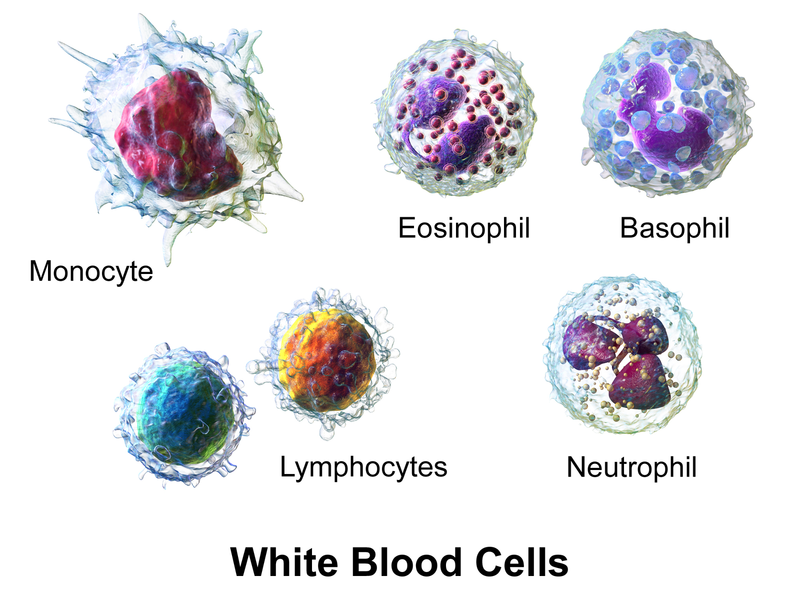Difference Between Red Blood Cell and White Blood Cell
Table of Contents
The key difference between red blood cell and white blood cell is the function it performs. Red blood cells transport oxygen from lungs to cells and tissues of the body and transport carbon dioxide from tissues to the lung. White blood cells are an integral part of the immune system that helps to defend against infectious agents that enter the body.
Blood is a complex connective tissue. It consists of two components: plasma and blood cells. The plasma is a viscous alkaline fluid which accounts for 55% of total blood volume. Blood cells occupy the rest of the 45% of the blood volume. There are of two main types of blood cells namely red blood cells and white blood cells.
CONTENTS
1. Overview and Key Difference
2. What is a White Blood Cell
3. What is a Red Blood Cell
4. Similarities Between Red Blood Cell and White Blood Cell
5. Side by Side Comparison – Red Blood Cell vs White Blood Cell in Tabular Form
6. Summary
What is a Red Blood Cell?
Red blood cells (RBC) or erythrocytes are the most common cell type in the blood (4.5-5.5 million). They have a biconcave shape, and their diameter is 6 µm. They do not have a nucleus as an adaptive measure to carry out their functions efficiently. The lifespan of an RBC is about 120 days; it is destroyed in the spleen/liver.

Figure 01: Red blood cell
The production of RBC occurs in the bone marrow of large bones. The presence of the red coloured haemoglobin pigment which combines reversibly with oxygen is an important characteristic of erythrocytes. The enzyme carbonic anhydrase helps to transport carbon dioxide from cells to the lung.
What is a White Blood Cell?
Leucocytes or white blood cells (WBC) are one of the main types of blood cells. They are spherical in shape and colourless compared to red blood cells. The number of WBCs in blood has a range of 7,000-10,000/mm3. There are five types of WBCs which can be distinguished by their staining characters, size and the shape of their nuclei.

Figure 02: White blood cells
Based on the staining character, there are two types: granulocytes and agranulocytes. Granulocytes contain a lobed nucleus and a granulated cytoplasm. They are all capable of amoeboid movement and are further subdivided into neutrophils, eosinophils, and basophils. Neutrophils and eosinophils are capable of phagocytising foreign invasive cells, and cellular secretion of particles. Basophile granules contain histamines and heparin, which help to cause an inflammatory reaction. Agranulocytes possess a non-granular cytoplasm and either an oval or a bean-shaped nucleus. There are two main types of agranulocytes: monocytes and lymphocytes. These help the body fight against disease and external infections through phagocytosis and making antibodies, respectively.
What are the Similarities Between Red Blood Cell and White Blood Cell?
- Red blood cells and white blood cells are main components of blood.
- They are very important cells for animals.
- Both originate for the same cell.
- Both are produced in bone marrows.
What is the Difference Between Red Blood Cell and White Blood Cell?
Red blood cell, (erythrocyte) is a biconcave shaped cell found in blood which transports gases from and to the lungs. In contrast, white blood cell is a spherical shaped cell which functions as an immune cell. As their names suggest, the former is red in colour, but the latter is colourless. Moreover, red blood cells account for 40-45% of total volume of the blood. There is only one type of red blood cells. Low counts of it lead to anemia. However, white blood cells account for 1% of the total volume of blood. There are five types of it: neutrophils, basophils, eosinophils, lymphocytes, and monocytes. Low counts of these cells can lead to leucopenia.
In addition, red blood cells are produced through a process called erythropoiesis while white blood cells are produced through a process called leucopoiesis. The former has a lifespan of 120 days while the latter has a lifespan of 5 to 21 days.

Summary – Red Blood Cell vs White Blood Cell
Red blood cell and white blood cell are two components of blood cells. Red blood cells are the most abundant cell type which transport oxygen and carbon dioxide from and to the lungs. White blood cells function in immune responses. This is the difference between red blood cell and white blood cell.
Reference:
1.“Blood Basics.” Blood Clots, 8 Sept. 2017, Available here.
2. “Functions of Red Blood Cells, White Blood Cells & Platelets” Study.com, Available here.
Image Courtesy:
1. Red blood cell” By Database Center for Life Science (DBCLS) (CC BY 3.0) via Commons Wikimedia
2.”Blausen 0909 WhiteBloodCells” By Blausen.com staff (2014). “Medical gallery of Blausen Medical 2014”. WikiJournal of Medicine 1 (2). DOI:10.15347/wjm/2014.010. ISSN 2002-4436. – Own work (CC BY 3.0) via Commons Wikimedia
ncG1vNJzZmivp6x7pbXFn5yrnZ6YsqOx07CcnqZemLyue8OinZ%2Bdopq7pLGMm5ytr5Wau26%2BxJ1km6SfpLFur8Slo2aZnpl6t7%2BMsJ%2BirJVir627zp1knJ2coXw%3D